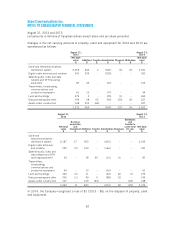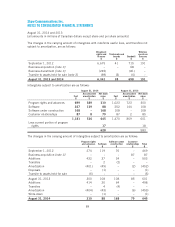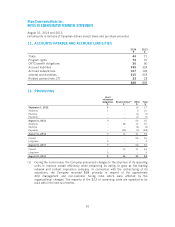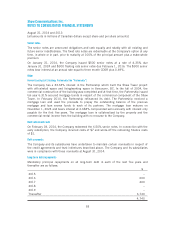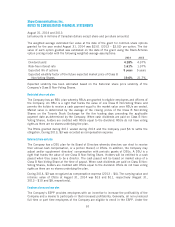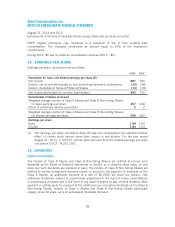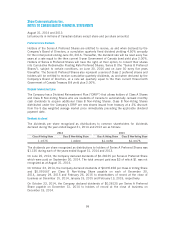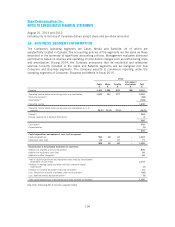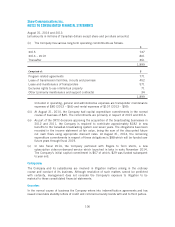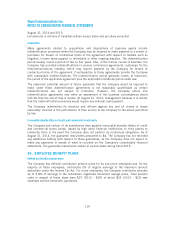Shaw 2014 Annual Report Download - page 101
Download and view the complete annual report
Please find page 101 of the 2014 Shaw annual report below. You can navigate through the pages in the report by either clicking on the pages listed below, or by using the keyword search tool below to find specific information within the annual report.
Shaw Communications Inc.
NOTES TO CONSOLIDATED FINANCIAL STATEMENTS
August 31, 2014 and 2013
[all amounts in millions of Canadian dollars except share and per share amounts]
The weighted average estimated fair value at the date of the grant for common share options
granted for the year ended August 31, 2014 was $2.61 (2013 – $2.53) per option. The fair
value of each option granted was estimated on the date of the grant using the Black-Scholes
option pricing model with the following weighted-average assumptions:
2014 2013
Dividend yield 4.18% 4.37%
Risk-free interest rate 1.61% 1.37%
Expected life of options 5 years 5 years
Expected volatility factor of the future expected market price of Class B
Non-Voting Shares 19.6% 21.7%
Expected volatility has been estimated based on the historical share price volatility of the
Company’s Class B Non-Voting Shares.
Restricted share unit plan
The Company has an RSU plan whereby RSUs are granted to eligible employees and officers of
the Company. An RSU is a right that tracks the value of one Class B Non-Voting Share and
permits the holder to receive a cash payment equal to the market value once RSUs are vested.
Market value is determined by the average of the closing prices of the Class B Non-Voting
Shares on the Toronto Stock Exchange for the five trading days preceding the applicable
payment date as determined by the Company. When cash dividends are paid on Class B Non-
Voting Shares, holders are credited with RSUs equal to the dividend. RSUs do not have voting
rights as there are no shares underlying the plan.
The RSUs granted during 2011 vested during 2013 and the Company paid $6 to settle the
obligation. During 2013, $3 was recorded as compensation expense.
Deferred share unit plan
The Company has a DSU plan for its Board of Directors whereby directors can elect to receive
their annual cash compensation, or a portion thereof, in DSUs. In addition, the Company may
adjust and/or supplement directors’ compensation with periodic grants of DSUs. A DSU is a
right that tracks the value of one Class B Non-Voting Share. Holders will be entitled to a cash
payout when they cease to be a director. The cash payout will be based on market value of a
Class B Non-Voting Share at the time of payout. When cash dividends are paid on Class B Non-
Voting Shares, holders are credited with DSUs equal to the dividend. DSUs do not have voting
rights as there are no shares underlying the plan.
During 2014, $3 was recognized as compensation expense (2013 – $4). The carrying value and
intrinsic value of DSUs at August 31, 2014 was $13 and $11, respectively (August 31,
2013 – $10 and $8, respectively).
Employee share purchase plan
The Company’s ESPP provides employees with an incentive to increase the profitability of the
Company and a means to participate in that increased profitability. Generally, all non-unionized
full time or part time employees of the Company are eligible to enroll in the ESPP. Under the
97


